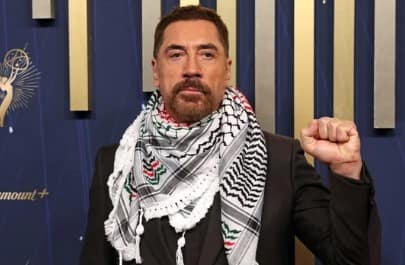Javier Bardem Declares “Free Palestine” at Emmys, Refuses to Work With Anyone Supporting “Genocide”
September 15, 2025 — Oscar-winning actor Javier Bardem used his red carpet appearance at the 77th Primetime Emmy Awards to make a bold political statement. While dressed for what might have been a night celebrating television, Bardem turned the spotlight toward Gaza, declaring he “denounces the genocide in Gaza” and calling for a “Free Palestine.”
His Message
When asked by reporters how he would respond if he found out a media company he might work with is involved with Israel, Bardem said simply, “I won’t work.”
He emphasized: “I cannot work with somebody that justifies or supports the genocide. That’s as simple as that.”
He referenced the International Association of Genocide Scholars (IAGS), which recently declared that what is happening in Gaza meets the definition of genocide.
Bardem also wore a keffiyeh — a patterned scarf associated with Palestinian identity and resistance — as part of his red carpet attire.
:max_bytes(150000):strip_icc():format(webp)/Javier-Bardem-77th-Primetime-Emmy-Awards-091525-02-74403c1adb54407faee22b7825925495.jpg)
Image Credit: Amy Sussman/Getty
Broader Context and Related Actions
Bardem is among many in the entertainment industry who have signed the Film Workers for Palestine pledge. This initiative calls for boycotts or sanctions of institutions deemed complicit in what they consider genocide and apartheid against Palestinians.
Other celebrities at the Emmys also made statements:
Hannah Einbinder, winner of Outstanding Supporting Actress in a Comedy for Hacks, closed her speech saying “Free Palestine” among other political remarks.
Megan Stalter carried a bag with “Cease Fire!” and wore a pin from Artists4Ceasefire signaling support for Gaza.
:max_bytes(150000):strip_icc():format(webp)/Hannah-Einbinder-Megan-Stalter-Ruth-Negga-77th-Primetime-Emmys-091525-7e5b88796cc244c38f58967acae51075.jpg)
Image Credit: Maya Dehlin Spach/WireImage;Kevin Mazur/Getty;Frazer Harrison/Getty
Reactions & Significance
Bardem’s statements have generated both praise and criticism. Supporters commend his courage for using a high-profile platform to speak out and for aligning with a growing global movement demanding greater accountability in conflicts.
Critics argue that such pronouncements risk polarizing public opinion, especially when made in contexts like entertainment award shows that traditionally avoid overt political controversy.
The involvement of influential voices and institutions lends weight to these claims, but it also raises debates about how international law, terminology, and definitions (such as “genocide”) are applied in ongoing conflicts.
Why This Matters
Celebrity Platforms & Political Speech: Bardem’s appearance at the Emmys shows how stars are increasingly unwilling to separate their art from their activism, especially when global humanitarian crises are involved.
Defining “Complicity”: By refusing work with companies he deems complicit, Bardem is putting a spotlight on how businesses, media, and institutions may be connected to or enable state actions, directly or indirectly.
Shaping Public Discourse: Use of terms like “genocide,” along with visual symbols such as the keffiyeh, amplify media coverage and public awareness; this can shift conversation, but also can lead to intense debate over definitions, facts, and moral responsibility.
Movements Within the Industry: The Film Workers for Palestine pledge reflects a wider movement among creatives to use boycotts, statements, and symbolic acts to push for change.
Published by HOLR Magazine


